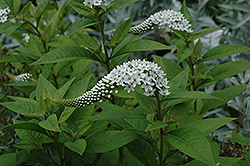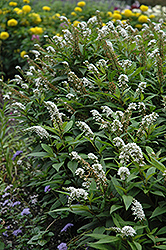Plant Search
Gooseneck Loosestrife
Lysimachia clethroides
Height: 3 feet
Spacing: 24 inches
Sunlight:
![]()
![]()
Hardiness Zone: 2
Ornamental Features
Gooseneck Loosestrife features unusual spikes of white flowers rising above the foliage from mid to late summer. The flowers are excellent for cutting. Its pointy leaves are emerald green in colour. As an added bonus, the foliage turns a gorgeous coppery-bronze in the fall.
Landscape Attributes
Gooseneck Loosestrife is an herbaceous perennial with an upright spreading habit of growth. Its medium texture blends into the garden, but can always be balanced by a couple of finer or coarser plants for an effective composition.
This is a high maintenance plant that will require regular care and upkeep, and is best cleaned up in early spring before it resumes active growth for the season. It is a good choice for attracting butterflies to your yard. Gardeners should be aware of the following characteristic(s) that may warrant special consideration;
- Invasive
- Self-Seeding
Gooseneck Loosestrife is recommended for the following landscape applications;
- Mass Planting
- General Garden Use
- Naturalizing And Woodland Gardens
- Bog Gardens
Planting & Growing
Gooseneck Loosestrife will grow to be about 3 feet tall at maturity, with a spread of 3 feet. When grown in masses or used as a bedding plant, individual plants should be spaced approximately 24 inches apart. It tends to be leggy, with a typical clearance of 1 foot from the ground, and should be underplanted with lower-growing perennials. It grows at a fast rate, and under ideal conditions can be expected to live for approximately 10 years. As an herbaceous perennial, this plant will usually die back to the crown each winter, and will regrow from the base each spring. Be careful not to disturb the crown in late winter when it may not be readily seen!
This plant does best in full sun to partial shade. It is quite adaptable, prefering to grow in average to wet conditions, and will even tolerate some standing water. It is not particular as to soil type or pH. It is somewhat tolerant of urban pollution. This species is not originally from North America. It can be propagated by division.



